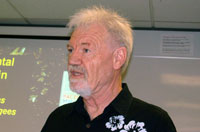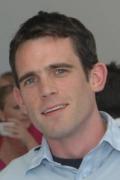AUCKLAND: Climate change migration and refugees is a critical human rights issue in the Pacific and a stronger media focus is needed, says Pacific Media Centre associate professor David Robie.
Dr Robie addressed an audience at AUT University on World Press Freedom Day, criticising the lack of direct language reporting the scale of the problem facing the region.
He said the semantics of bodies such as the Office of the High Commissioner for Human Rights “euphemistically” referred to climate change migrants as "internally displaced persons".
 Dr Robie was talking about genuine refugees who have been forced to flee their homelands - such as the remote Carteret Islands and Takuu in Papua New Guinea - due to rising sea levels.
Dr Robie was talking about genuine refugees who have been forced to flee their homelands - such as the remote Carteret Islands and Takuu in Papua New Guinea - due to rising sea levels.
“What’s wrong with ‘people?’” he said. “It’s just sanitised jargon. Let’s call a spade a spade.”
The Carteret Islands, about 85pm to the north-east of Bougainville, may be the first to disappear in the near future, due to the rising sea levels.
Dr Robie also singled out Takuu Atoll, which is home to around 400 people, featured in the documentary There Once Was an Island: Te Henua e Nnoho.
Being some 250km away from Bougainville, the nearest mainland, the problems are compounded for the people of Takuu.
Dr Robie said reporters in the Pacific had a responsibility to continually raise the issue of climate change refugees to the attention of the world.
He said some good work had been done by international journalists in the past.
However, he said there were also "implications of a media ‘feeding frenzy’ over the plight of climate change refugees”.
More reporting needed
Since COP 15 in Copenhagen, Denmark, the issue has been “downplayed and forgotten about” to a degree. But the Pacific Islands Forum Secretariat had organised a conference on the issue in Suva this week.
While complimenting agencies such as SPREP and their resources made available to the media, he said news organisations needed to keep the issue at the top of the agenda.
Dr Robie quoted the Pulitzer Centre, which reported that one tenth of the global population – 634 million people – live in low-lying coastal areas, and 75 per cent of those people live in Asia and the Pacific “in the poorest pockets of the globe with limited resources”.
While there was so much living evidence for the issue, Dr Robie asked why more was not being done by journalists in the Pacific.
“It is a big challenge for journalists in the region,” he said.
“Much more needs to be reported.”
He also argued that Western mainstream media needed to take more notice as well in spite of reduced resources due to “the relentless pursuit for ratings, short-term circulation spin-offs, the dumbing down of content and ruthless cutting back of staff”.
However, he also singled out praiseworthy and recent examples of coverage, such as undertaken by Reportage Enviro, published by the University of Technology Sydney’s journalism school, in conjunction with the Australian Centre for Independent Journalism.
Kiribati worries
Taberannang Korauaba, a Pasifika journalist working in Auckland and publishing a community website, confirmed Dr Robie’s criticisms of local media in the Pacific, speaking of his own country of Kiribati.
“What we are worried about is that we hardly have any stories from the local media about what is happening there,” he said.
“The government is actually struggling to convince people about climate change, and while the media has the responsibility, it lacks the expertise and the resources to have an impact.”
Dr Robie proposed a method of traditional best-practice journalism to improve the reporting on issues such as climate change refugees.
He encouraged journalists to “place more emphasis on the news ‘process’ rather than simply the event, as mainstream journalism often tends to do”.
He praised Nepali Times publisher Kunda Dixit and his 1997 book Dateline Earth: Journalism as if the planet mattered as “a classic in environmental and development journalism”. This book has just been republished with new updated sections in Bangkok.
He described Dixit as “one of the most innovative thinkers about independent journalism in the Asia-Pacific region”.
World Press Freedom Day
Dr Robie said it was sad that the May 3 World Press Freedom Day - such an important annual event around the Pacific region - was “hardly ever mentioned in New Zealand media”.
He said the idea began after a meeting in Africa and the subsequent Windhoek Declaration, in the wake of historic events such as the fall of the Berlin Wall in 1989.
Countless examples of injustice to members of the press are featured by global media freedom groups and Dr Robie singled out the Ampatuan massacre in the Philippines for special recognition.
“It was the world’s worst single mass murder on journalists,” he said.
“Out of the 57 people murdered, 33 were journalists.”
The case is still before the authorities, and the Manila Sun Star reports that 90 arrests have been made. However, 100 suspects are still at large and human rights groups such as IFJ is regularly calling for further action in what has been a sluggish process to bring the perpetrators to justice.



